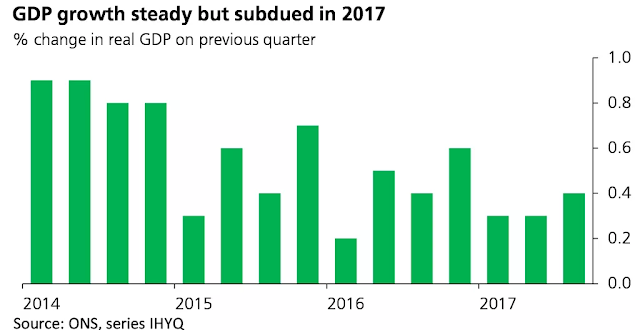The Autumn Budget 2017 of UK. How are the economy and public finances performing? Why are we having a budget in autumn?

What's the economic situation? Growth
Economic growth has remained stable, but modest so far in 2017, on the back of a slowdown in consumer spending. Latest quarterly GDP growth of 0.4% in the third quarter (Q3 2017) was similar to the 0.3% recorded in Q1 and Q2.

However, GDP growth is slowing. GDP growth stood at 1.5% in Q3 2017 compared with a year ago. This contrasts with many other advanced economies, especially the Eurozone, which has seen growth accelerate in 2017.

The official forecasts for the producers of the Office for Budget Responsibility (OBR) - 2017 sonbahar bütçesindeki üretkenlik tahminlerini düşürmeyi hedefliyor, muhtemelen, GSYİH büyüme tahminlerini düşürdü.
Prices and wages
Consumers have been squeezed by rising inflation following the fall of the value of the pound, notably following the June 2016 EU referendum. Inflation is currently at 3.0%, while the average wage growth rate for inflation was 0.6% lower than a year before.

Wage growth remains weak despite the lowest rate since 1975 and near-record employment rates.

Interest rates
With the increase of its inflation rate of 2%, the Bank of England raised interest rates from 0.25% to 0.5% in early November. This was the first rate increase since 2007. The Bank has been increasing its rate of growth forecasts.

What's going on in the public finances? Borrowing and debt
In 2016/17 the government borrowed £ 46 billion to make the difference between its spending and income from taxes and other sources. Borrowing often referred to as the deficit, is now at a similar level before the 2007-2008 financial crisis.
In March 2017, the OBR forecast that the government will borrow more in 2017/18 than in 2016/17. This is still expected to be the case for the first half of 2017/18. The OBR forecast that borrowing will be reduced to the end of their forecast in 2021/22.

At 86% of the GDP, the public sector net debt is largely due to the recent deficits - still relatively high by recent and international standards. The OBR is forecast to reach around 80% of GDP by the end of this Parliament.

Developments since March 2017
A series of developments since March 2017 may impact on the OBR's borrowing forecasts:
- The OBR is "significantly reducing" their assumption for potential productivity growth, which will lower economic growth forecasts and increase debt.
- The Office for National Statistics (ONS) is moving to the private sector. Their borrowing - about £ 3 billion in 2016/17 - will not impact on the deficit.
- There was an underlying change in the public finances. The Economics think tank - The Institute for Fiscal Studies (IFS) - estimates that the improvement could be lower borrowing by around £ 11 billion per year.
- Since March 2017 the Government has introduced a new policy and some previously announced policies, which will affect spending and revenue.
- The Bank of England's decision to raise interest rates in November will directly affect the Government's spending on debt interest.
Why are we having a budget in autumn? From autumn 2017 the Government is presenting a single autumn budget, to allow for more than the implementation of the budget. This is intended to put forward a two-year budget in the Budget and Autumn Statement. Autumn Budget 2017 is the first announced under this new approach.
The OBR will continue to publish two sets of forecasts a year - one alongside the Autumn Budget and the other in the spring. The Government will present a formal response to the OBR's spring forecast.
Where can I get more information? The Library's Autumn Budget 2017: Background briefing discusses the economic situation and public finances in more detail. In the briefing, we also take a look at some of the issues that may come up in the Budget, including public sector pay and Universal Credit. We also discuss the ubiquitous issue of Brexit: specifically, how the OBR have accounted for Brexit in their forecasts and how much the government has allocated to departments for prepare for it.
The Library briefing, The Budget and the annual Finance Bill, discusses how Parliament debates the budget and scrutinizes the Bill of Rights.
The Library will publish a summary of Autumn Budget on the evening of 22 November.
Look out for Autumn Budget related blogs on the Library's blog, Second Reading.
No comments:
Post a Comment